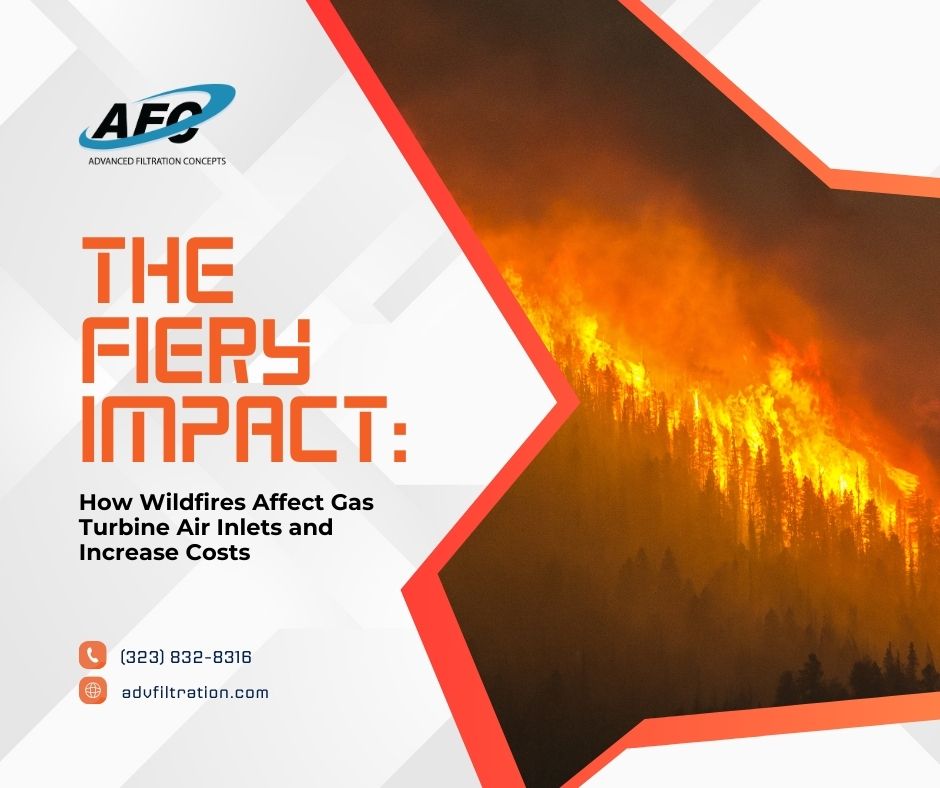Wildfires are a natural phenomenon that has gained unprecedented attention due to their increasing frequency and intensity, attributed largely to climate change. While the devastating impact of wildfires on ecosystems, homes, and lives is widely acknowledged, their indirect effects on critical infrastructure are often overlooked. One such infrastructure component that can be significantly affected by wildfires is gas turbine air inlets. In this article, we’ll delve into how wildfires can impact gas turbine air inlets and the subsequent consequences of increased particle clogging in air filters.
The Role of Gas Turbine Air Inlets
Gas turbines are vital components in various industries, including power generation, aviation, and industrial manufacturing. These machines rely on a steady flow of clean and cool air to ensure efficient combustion and optimal performance. Air inlets are designed to provide this air, playing a crucial role in maintaining the turbine’s efficiency, longevity, and overall operational reliability.
The Wildfire Connection
Wildfires produce massive amounts of smoke, ash, and particulate matter that can travel vast distances. When these particles come into contact with gas turbine air inlets, they pose a serious threat to the turbine’s performance. The high temperatures within the turbine create an ideal environment for the accumulation of particles on turbine components, particularly on air filters.
Impact on Air Filters
Air filters are the first line of defense against the ingress of harmful particles into gas turbines. When exposed to the debris generated by wildfires, air filters can become clogged at an accelerated rate. This leads to a series of adverse consequences:
- Reduced Efficiency: Clogged air filters restrict the airflow to the turbine, impeding the combustion process. This reduction in air intake can result in decreased power output and reduced efficiency.
- Increased Fuel Consumption: With restricted airflow, the turbine may require more fuel to maintain its designed output, driving up operational costs.
- Higher Maintenance Frequency: Clogged air filters necessitate more frequent maintenance and replacement, resulting in increased downtime and associated costs.
- Potential Damage to Turbine Components: The accumulation of particles can lead to fouling on compressor blades and other sensitive components, potentially causing long-term damage and shortening the turbine’s lifespan.
- Elevated Emissions: Inefficiencies caused by particle-clogged filters can lead to higher emissions of pollutants, contributing to environmental concerns.
Escalating Costs
The costs associated with maintaining gas turbines and ensuring their optimal performance can be substantial. Wildfires exacerbate these costs through increased air filter replacement, additional maintenance, and reduced operational efficiency. The financial burden is not limited to immediate post-wildfire periods but can extend well beyond as the effects of particle accumulation and reduced efficiency persist.
Mitigation Strategies
To minimize the impact of wildfires on gas turbine air inlets and subsequent costs, a proactive approach is crucial:
- Regular Maintenance: Establishing a robust maintenance schedule for air filter inspection and replacement is essential to prevent excessive particle buildup.
- Advanced Filtration Concepts: Investing in advanced filtration systems capable of handling higher levels of particulate matter can extend the lifespan of air filters and reduce maintenance frequency. At Advanced Filtration Concepts, we offer the highest quality in air filtration products and services.
- Monitoring and Early Warning Systems: Implementing monitoring systems that can detect changes in air quality due to wildfires can provide valuable time for preparatory measures.
- Emergency Plans: Developing comprehensive emergency response plans that address the specific challenges posed by wildfires can help mitigate the impact on gas turbine operations.
Conclusion
Wildfires have far-reaching consequences that extend beyond their immediate visible effects. The impact of wildfires on gas turbine air inlets, through accelerated particle accumulation and clogged air filters, can significantly increase operational costs and decrease overall efficiency. Recognizing this indirect but critical consequence of wildfires underscores the importance of investing in proactive measures and advanced technologies (such as quality Gas Turbine Inlet Air Filters) to safeguard gas turbine infrastructure and ensure its reliability in the face of an increasingly unpredictable environment.

